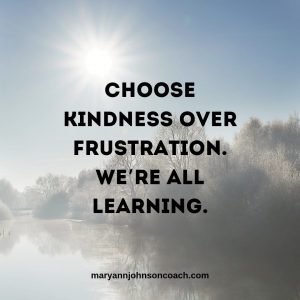 As a middle-aged mother, with struggling children, it was hard to believe in anything but the dissolution of my family. I felt like a failure. My family didn’t look anything like I planned. Where were the calm and peaceful nights sitting around the fireplace popping corn? Where were the bedside chats filled with laughter and love? Where were the days of working and playing together?
As a middle-aged mother, with struggling children, it was hard to believe in anything but the dissolution of my family. I felt like a failure. My family didn’t look anything like I planned. Where were the calm and peaceful nights sitting around the fireplace popping corn? Where were the bedside chats filled with laughter and love? Where were the days of working and playing together?
These are the things that I envisioned as a young woman. But to have these impossible things I needed to understand that they didn’t just happen because we were a family. They would happen as I connected to my children multiple times a day; as I spent time and was present as we ate together, played together, worked together; as I listened.
I lacked many of those skills. Worse, I didn’t even know I needed them. I assumed that getting married, having kids and taking care of them and my home was all I needed to do. It was a shock when the whole thing was harder than I anticipated; when I realized I didn’t know what I was doing; when I understood that connection required touching, being together and listening. None of this came naturally to me.
I share the fact that I contemplated suicide
because I know I’m not the only one who has felt despair, who has believed that the impossible couldn’t happen.
But I, like the queen, kept believing in the impossible. I got up day after day determined to hold it together; determined to hold on to my family. I searched for what would make a difference. I found resources and support along the way. I worked to change. I practiced when it was darn hard. Even though I occasionally checked out, I always checked back in and hung on. I kept believing that if I didn’t give up, if I changed, learned, and grew, my family was possible.
Interestingly, the mistakes we make, and the trials of our parenting are sometimes the very things that, in the end, bind our family together. That’s what happened to us. Because none of us gave up, because we kept believing in impossible things, impossible things happened. Impossible things are still happening in our family. My 45-year-old son just graduated from college. His story is one of believing in the impossible.
All seven of my children are wonderful, growing adults. They’re loyal, generous, kind and connected to each other and to Don and me. They all have challenges because that is life. In their families they deal with sexual identity issues, blindness of a spouse, not finding a spouse, unable to have children, special needs kids, divorce, faith crisis, depression, learning difficulties, getting more schooling, etc.
Each day as I kneel to pray, I talk with God about all the impossible things our family needs and I believe they can happen. On my bedroom wall are pictures of the impossible things I long and work for. I believe in the impossible because I have seen the impossible become reality.
My youngest daughter’s childhood icon was Audrey Hepburn. Maybe it’s because she looks like her. Audrey Hepburn was a wonderful actress but her true greatness came later in life as she tackled impossible things as a humanitarian. She worked in some of the poorest communities of Africa, South America, and Asia. She said, 
I know it can be hard as you build your family. I know that sometimes it feels like a failure, you feel like a failure. I know that you don’t always have what you need, but if you hang on, give up blame and victimhood, and work to grow and change, then nothing is impossible. In the words of Robert Schuller, “The only place where your dream becomes impossible is in your own thinking.”
Be like the Queen, start every day thinking about the impossible as if it is possible.





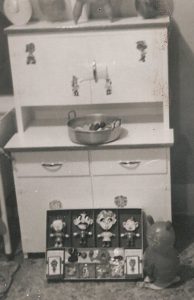



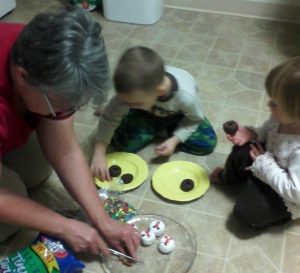
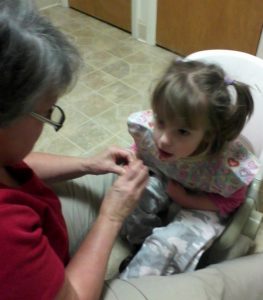 this way.” So, I compiled a packet of simple, inexpensive and family-centered activities to help myself and others spend some quality time together at Christmas. I combed the Internet and gathered information and links so you wouldn’t have to.
this way.” So, I compiled a packet of simple, inexpensive and family-centered activities to help myself and others spend some quality time together at Christmas. I combed the Internet and gathered information and links so you wouldn’t have to.  When I first put this together I tried it out. I had a few of my grands over and we did two of the activities. We made donut snowmen and donut reindeer. We learned that frosting and candies do not stick on powdered donuts very easily! We learned that if you don’t keep an eye on them, the noses will disappear from the snowmen’s faces. (Jack was that you?)
When I first put this together I tried it out. I had a few of my grands over and we did two of the activities. We made donut snowmen and donut reindeer. We learned that frosting and candies do not stick on powdered donuts very easily! We learned that if you don’t keep an eye on them, the noses will disappear from the snowmen’s faces. (Jack was that you?)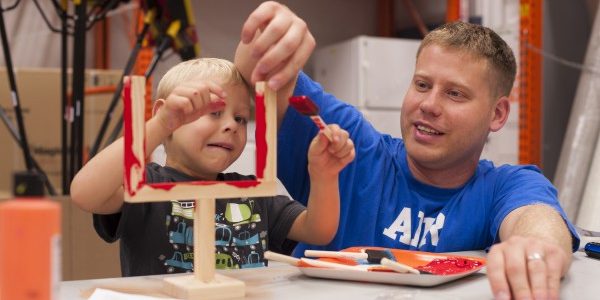
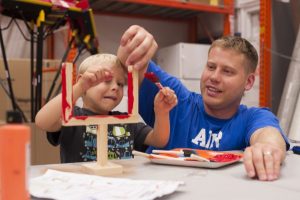 Kids
Kids 



 Recently, I taught a class on consistency. I have taught this topic many times and have written about it often. I gave the class some tips on how to work toward being more consistent. However, this year I added a new tip that I have learned the hard way over the last couple of years. It applies to more than just remaining consistent. It applies to every change we want to make or promise we want to keep.
Recently, I taught a class on consistency. I have taught this topic many times and have written about it often. I gave the class some tips on how to work toward being more consistent. However, this year I added a new tip that I have learned the hard way over the last couple of years. It applies to more than just remaining consistent. It applies to every change we want to make or promise we want to keep.
 Many years ago, I read a book that illustrated how we can fit more of what matters into our day. We’re all busy. We have tons to do, less time for rest, and most of us suffer from a feeling of overwhelm. We can do something about this. We don’t need to be victims of busyness.
Many years ago, I read a book that illustrated how we can fit more of what matters into our day. We’re all busy. We have tons to do, less time for rest, and most of us suffer from a feeling of overwhelm. We can do something about this. We don’t need to be victims of busyness.
 My family took a drive to the mountains to see the fall colors. It was a perfect day. We stopped for a picnic in a small-town park. We parked on the South end where there was a pavilion of tables. On the east side of the park, we could see a playground. The north side of the park housed an event building. On the west was a closed concession stand. But there was no restroom.
My family took a drive to the mountains to see the fall colors. It was a perfect day. We stopped for a picnic in a small-town park. We parked on the South end where there was a pavilion of tables. On the east side of the park, we could see a playground. The north side of the park housed an event building. On the west was a closed concession stand. But there was no restroom. the concession stand and a large tree.
the concession stand and a large tree. Life’s like this. Parenting is like this. We can find ourselves in great need of something that doesn’t seem available to us. We might lack skills, resources, or information, which makes it challenging to grow, change, be better, have peace, etc. Often, like the bathroom, we may know what’s missing but don’t know where to find it.
Life’s like this. Parenting is like this. We can find ourselves in great need of something that doesn’t seem available to us. We might lack skills, resources, or information, which makes it challenging to grow, change, be better, have peace, etc. Often, like the bathroom, we may know what’s missing but don’t know where to find it.


 Every year at Christmas I make a few thousand gingerbread cookies. It’s a family tradition that’s been going on for almost fifty years. The cookies all look the same with their ginger brown bodies and cinnamon eyes. You know that each one is going to taste delicious.
Every year at Christmas I make a few thousand gingerbread cookies. It’s a family tradition that’s been going on for almost fifty years. The cookies all look the same with their ginger brown bodies and cinnamon eyes. You know that each one is going to taste delicious. Grandma Roze looked like the quintessential grandmother. She was soft and round with grey hair. But that’s where it stopped. Grandma Roze had only a fourth-grade education but she owned the ‘Sweet Shop’ which was situated next to the town’s only theater. There were no treats in the theater. If you wanted treats during the movie you had to see my grandmother. She managed her shop for thirty years. She was a great businesswoman.
Grandma Roze looked like the quintessential grandmother. She was soft and round with grey hair. But that’s where it stopped. Grandma Roze had only a fourth-grade education but she owned the ‘Sweet Shop’ which was situated next to the town’s only theater. There were no treats in the theater. If you wanted treats during the movie you had to see my grandmother. She managed her shop for thirty years. She was a great businesswoman.
 Grandma Ann was Grandpa Dean’s second wife. She was a schoolteacher, compact, and brooked no nonsense. She lived in a brick house in a beautiful small town. We didn’t go there often because she didn’t like my dad. We all knew it. Even though I knew how she felt I loved going to Grandma Ann’s. She had a special cupboard. It was filled with paper, crayons, markers, chalk, small blank books, pencils, and pens. It was the most amazing thing. I knew that despite any trouble the adults were having my Grandma Ann must care about us because she kept that cupboard stocked and when we got there, we could take whatever we wanted. I opted for the little blank books because I was sure, in my little girl’s heart, that
Grandma Ann was Grandpa Dean’s second wife. She was a schoolteacher, compact, and brooked no nonsense. She lived in a brick house in a beautiful small town. We didn’t go there often because she didn’t like my dad. We all knew it. Even though I knew how she felt I loved going to Grandma Ann’s. She had a special cupboard. It was filled with paper, crayons, markers, chalk, small blank books, pencils, and pens. It was the most amazing thing. I knew that despite any trouble the adults were having my Grandma Ann must care about us because she kept that cupboard stocked and when we got there, we could take whatever we wanted. I opted for the little blank books because I was sure, in my little girl’s heart, that
